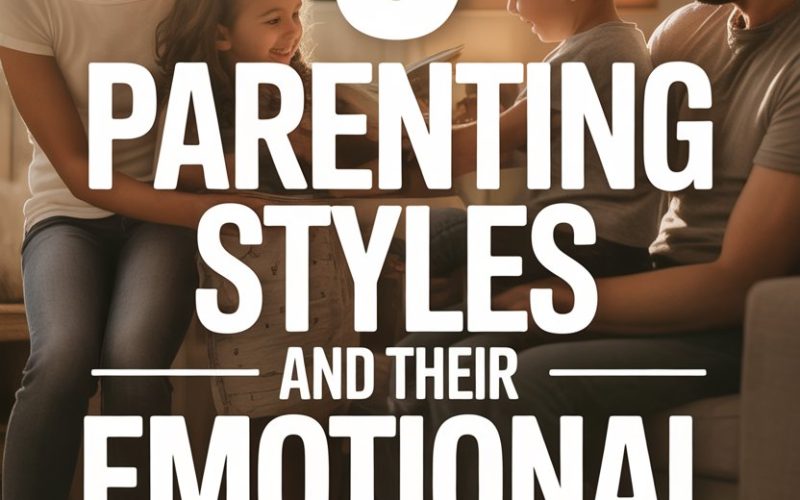Parenting is a bit like assembling IKEA furniture: you’re convinced everyone else knows the secret manual, and there’s always one piece left over.
Add in the emotional wellbeing of your kids, and suddenly the stakes feel higher than a game of Jenga with the family cat.
Let’s unpack five classic parenting styles and how each might shape your child’s emotional weather forecast—whether you’re raising a gentle breeze or a tornado.
1. Authoritative Parenting
Picture Mary Poppins with a touch of real‑world messiness. Authoritative parents set clear expectations, but listen—really listen—to their child’s perspective. Rules exist, but so do explanations, family meetings, and the occasional negotiation (with or without biscuits as leverage).
Research highlighted by the American Psychological Association has linked this style to kids who are more confident, socially adept, and emotionally healthy.
Why? Children raised with warmth and structure learn self‑regulation and resilience. They know where the boundaries are, but also feel safe asking, “why?” without being steam‑rolled.
At home, this might look like discussing the reason behind a screen‑time limit instead of barking, “Because I said so!”
It means owning your mistakes (“Mum just reversed over the wheelie bin. Again. Sorry!”), and expecting your child to do the same.
Try this: Next time your child pushes back on a rule, invite them to share their view. Listen, acknowledge their feelings, and explain your reasoning. Then stand firm—compromise doesn’t mean caving.
2. Authoritarian Parenting
Imagine a household run by a drill sergeant with a chart for everything. Authoritarian parents believe in obedience, swift discipline, and not much backchat. “Because I said so” is practically the family motto.
Studies—such as those highlighted in this Child Mind Institute article—show that kids raised in these settings can be well‑behaved, organised, and even high achievers.
But the emotional trade‑off? Higher risks of anxiety, lower self‑esteem, and a sneaky tendency to rebel when no one’s looking.
Harsh discipline may squash poor behaviour, but it tends to trample emotional expression. Children may learn to suppress feelings (until they erupt at the worst moment—like in Tesco).
Curious if you’re drifting into this camp? If “my house, my rules” rings out more than laughter, consider softening the edges. Invite small choices—let your child pick their snack or choose which jumper to wear.
This signals respect for their autonomy without sacrificing your authority.
3. Permissive Parenting
Think ‘best friend’ with a credit card and zero curfew. Permissive parents adore their children, offer truckloads of affection, and rarely utter the word “no.” Ice cream for dinner? Sure, you only live once.
While this style builds closeness, it can leave kids a tad adrift. Researchers have noted that children raised permissively often struggle with self‑discipline, impulse control, and managing disappointment.
Picture a toddler who’s never had to wait for a biscuit—then picture them at 16, navigating GCSE stress.
Emotionally, these children may feel loved, but anxious when the real world (unlike their parents) doesn’t bend to their every whim. They might battle frustration or seek constant reassurance.
If any of this sounds familiar, you can encourage emotional growth by introducing gentle boundaries. Start small: maybe just one episode of Bluey before bed, not six.
Sticking with it shows that boundaries aren’t barriers to love—they’re proof you care enough to say no.
4. Neglectful Parenting
No parent sets out to ignore their child. Yet life can get away from us: work, stress, or personal struggles can leave little ones feeling invisible.
Neglectful (or uninvolved) parenting isn’t simply about absent‑mindedness. It’s a chronic lack of both warmth and structure. Children are left to their own devices—sometimes literally, as in “Mum’s on the laptop again.”
Kids in these settings often struggle emotionally. The Harvard Center on the Developing Child points to higher rates of anxiety, poor social skills, and issues with attachment.
When a child feels emotionally adrift, they may look for connection in risky places or bottle up big feelings.
If you spot yourself slipping into this pattern—no shame, truly—tiny changes go a long way. Set aside ten minutes a day to give your child undivided attention.
Ask about their day, their favourite superhero, or what makes them laugh. The message is clear: you matter, even when life is busy.
5. Gentle Parenting
Gentle parenting sits at the intersection of empathy and boundaries. Think Supernanny, minus the naughty step and with a heavy dose of patient curiosity.
This style focuses on tuning into a child’s feelings, validating their experiences, and guiding rather than punishing. Tantrums aren’t something to squash—they’re a cry for help, like a fire alarm with legs.
Recent studies, like those discussed at Healthline, suggest children raised with gentle parenting tend to be emotionally literate, secure, and cooperative.
They’re more likely to trust their parents with the awkward or difficult stuff—eventually, even puberty.
But here’s the catch: gentle doesn’t mean pushover. Boundaries are firm but kind.
If your toddler attempts to feed the dog a crayon, you calmly intervene (“We don’t feed crayons to Buddy. How about this treat instead?”) rather than launching into a sermon or letting chaos rule.
Try this: When your child melts down, resist the urge to fix or dismiss their feelings. Instead, label the emotion (“Looks like you’re really frustrated”) and offer a hug or quiet time together.
Magic? Not quite. But it builds emotional resilience, bit by bit.
Every Family Is a Work‑in‑Progress
Parenting styles aren’t static. Most of us zigzag between loving structure and wild chaos depending on sleep, stress, and whether there’s coffee.
No one nails it daily, and that’s fine. Your style might look authoritative on Mondays and “what even is bedtime?” by Friday. The good news?
Kids are adaptable, and the very act of reflecting on your approach means you’re already helping shape emotionally healthy humans.
Tonight, try a small shift. Listen a bit longer. Explain a boundary. Say “no” with kindness.
And if chaos erupts—because it will—congratulate yourself for caring enough to keep showing up.
Even Mary Poppins probably had days when she wished her umbrella would whisk her away. The rest of us just stick the kettle on and try again tomorrow.




